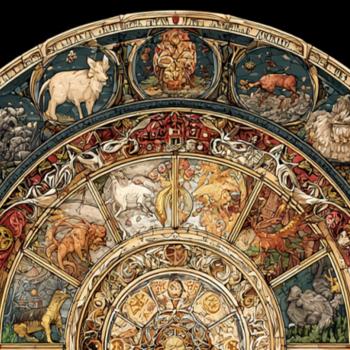What do we mean when we say that something is “inspired”?

For example, if I hear a song on the radio and I respond by saying that it was “inspired” what I mean is that I believe the song had a spiritual quality to it that enabled the God of the Universe to reveal something of truth or beauty [or both] to me through the words and melody of the song.
It’s the same for me if I view a magnificent work of art in a museum, or watch a film that transcends mere storytelling to communicate something deeper and more profound than perhaps even the screenwriter, director or actors intended.
But, does this “inspiration” suggest that God wrote that song, or penned that screenplay? No, of course not. Do I mean that God sang those notes or acted that scene? No, that would be silly.
I would also not mean that the “inspired” song or film or work of art was infallible or inerrant. Those terms would make no sense in relation to that song, or poem, or film, or painting, or sculpture.
When something is inspired, it is infused with truth and beauty and profound wisdom. It is an elemental conduit for the Divine to speak into our souls in a way that we might not otherwise be aware of, or open to.
This is what it means to say something is “inspired”.
So, why do we come to this book we call the Bible and apply totally different meanings to the term “inspiration”?
Sure, we all acknowledge that the Bible is filled with Truth about who God is and what God is like. We often marvel at the artistry and the beauty of the words, and we admire the elegance of the truth we find in its stories. We weep at the passion of Christ and then we weep again at His resurrection. We are moved by these words and inspired by these ideas of God’s boundless love for us that is higher, wider, longer and deeper than we can imagine. We are reassured to know that nothing can ever separate us from this unbreakable love and that Christ will never leave us, nor forsake us.
But, why then do we take that unnecessary step of saying that God wrote those words? Why do we insist that those words are infallible or inerrant? Why do we refuse to admit that there are errors, and mistakes, and contradictions all through it?
Those flaws only add to the humanity of these testimonies. God is perfect, but we are not. God is infallible, but we sometimes get it wrong.
Somehow, we have made the Scriptures the point of the story. But the Scriptures never point to the Scriptures. The Scriptures always point us to Christ.
To fail to see this, or to follow this intended path, will lead us to ruin. Why? Because a book cannot save you. A Bible cannot change you. A collection of stories and songs and poems and prophecies will never transform you into the image of Christ.
But if we can follow this map to its intended destination, we will be healed, and changed, and forever transformed.
There is no life in the Bible. Jesus said so.
There is only life in Christ.
Follow the map to the mark on the page. It all points us to Jesus. Knowing Him is not only possible without the Bible, it’s absolutely essential for an actual relationship with a living God.
**
Keith Giles is the author of several books, including the forthcoming “Jesus Unbound: How the Bible Keeps Us From Hearing the Word of God”, available July 4th, 2018.
He is also the author of the Amazon best-seller, “Jesus Untangled: Crucifying Our Politics To Pledge Allegiance To The Lamb”. He is the co-host of the Heretic Happy Hour Podcast on iTunes and Podbean. He and his wife live in Orange, CA with their two sons.
Please, join me at one of these upcoming events:
*The Nonviolent Love of Christ: How Loving Our Enemies Saves The World, with Joshua Lawson and Keith Giles on Saturday, June 16 in Portsmouth Ohio. Register here>
*Crucifying Our Politics with Keith Giles on June 24 in Cleveland, OH. Register here>
BONUS: Unlock exclusive content including blog articles, short stories, music, podcasts, videos and more on my Patreon page.













